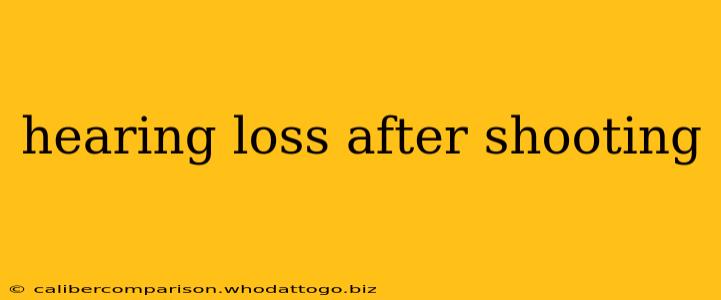Hearing loss is a significant concern for anyone who participates in shooting sports, from casual target practice to competitive events. The intense noise generated by firearms can cause immediate and long-term damage to the delicate structures of the inner ear, leading to a range of hearing problems. This article explores the causes, symptoms, and prevention of hearing loss associated with shooting, offering practical advice for responsible firearm handling and hearing protection.
The Science Behind Noise-Induced Hearing Loss (NIHL)
Noise-induced hearing loss (NIHL) is a prevalent type of hearing impairment caused by exposure to loud sounds. Firearms produce incredibly loud sounds, often exceeding 140 decibels—well above the threshold for immediate damage. This intense noise creates pressure waves that can physically damage the hair cells within the cochlea, the organ responsible for converting sound vibrations into electrical signals that the brain interprets as sound. Even a single exposure to extremely loud noise can cause significant hearing loss, while repeated exposure to moderately loud noises gradually leads to cumulative damage.
Types of Hearing Loss from Shooting
Shooting-related hearing loss can manifest in several ways:
-
Sudden Sensorineural Hearing Loss: This is a rapid and often significant loss of hearing, sometimes occurring after a single, extremely loud gunshot. It's characterized by a noticeable decrease in hearing sensitivity and can involve tinnitus (ringing in the ears).
-
Gradual Sensorineural Hearing Loss: This is a more common type, developing over time due to repeated exposure to loud noises. The hearing loss is progressive, meaning it worsens gradually over time.
-
Acoustic Trauma: This refers to immediate and significant damage to the inner ear from a single loud sound. This can lead to permanent hearing loss and tinnitus.
Recognizing the Symptoms of Shooting-Related Hearing Loss
Early detection is crucial for managing hearing loss effectively. Be vigilant for these symptoms:
-
Tinnitus: A persistent ringing, buzzing, hissing, or clicking sound in one or both ears.
-
Difficulty understanding speech, especially in noisy environments: This is a common sign of hearing loss.
-
Muffled sounds or a feeling of fullness in the ears: This can indicate damage to the middle or inner ear.
-
Hyperacusis: Increased sensitivity to everyday sounds that were previously tolerable.
Protecting Your Hearing on the Shooting Range
The most effective way to prevent hearing loss from shooting is to consistently use hearing protection. This includes:
-
Hearing Protection Devices (HPDs): These are essential for any shooting activity. Choose HPDs with a Noise Reduction Rating (NRR) that is appropriate for the firearms being used. Consider electronic muffs that amplify normal sounds while suppressing loud noises, or custom-molded earplugs for a comfortable and secure fit.
-
Distance and Barrier: Increase the distance from the firearm when possible. Shooting in an enclosed space further amplifies noise levels.
-
Regular Hearing Checkups: Schedule regular hearing exams with an audiologist, especially if you are a frequent shooter.
Beyond Hearing Protection: Holistic Approach to Hearing Health
While hearing protection is paramount, maintaining overall hearing health involves a comprehensive approach:
-
Proper Gun Maintenance: Ensure firearms are properly maintained to minimize unexpected loud noises.
-
Understanding Ballistics: Familiarize yourself with the decibel levels associated with different firearms and ammunition.
-
Limiting Exposure: Take breaks during shooting sessions to allow your ears to recover.
Conclusion: Prioritize Your Hearing
Hearing loss is preventable. By adopting responsible shooting practices, utilizing appropriate hearing protection, and undergoing regular hearing checks, you can significantly reduce your risk of developing NIHL. Remember, your hearing is a precious asset—protect it. This proactive approach ensures you can continue enjoying the shooting sports you love while preserving your long-term hearing health.

